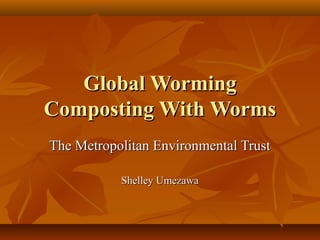Vermicomposting
•Download as PPT, PDF•
1 like•19,330 views
Worm Composting presentation by Shelley Umezawa, The M.e.t's Outreach & Volunteer Coordinator
Report
Share
Report
Share

Recommended
Recommended
Grow Your Own, Nevada! Fall 2012: Safe Composting and Vermicomposting

Grow Your Own, Nevada! Fall 2012: Safe Composting and VermicompostingUniversity of Nevada Cooperative Extension
More Related Content
What's hot
Grow Your Own, Nevada! Fall 2012: Safe Composting and Vermicomposting

Grow Your Own, Nevada! Fall 2012: Safe Composting and VermicompostingUniversity of Nevada Cooperative Extension
What's hot (20)
Grow Your Own, Nevada! Fall 2012: Safe Composting and Vermicomposting

Grow Your Own, Nevada! Fall 2012: Safe Composting and Vermicomposting
Compost, science behind it and the how and why of doing it

Compost, science behind it and the how and why of doing it
Vermicomposting Technology for Solid Waste Management

Vermicomposting Technology for Solid Waste Management
Vermicomposting Guide: Using Red Wigglers to Reduce Your Waste

Vermicomposting Guide: Using Red Wigglers to Reduce Your Waste
Vermicomposting Practical Guide: An Ecological Way of Dealing with Organic Waste

Vermicomposting Practical Guide: An Ecological Way of Dealing with Organic Waste
Manual of On-Farm Vermicomposting and Vermiculture

Manual of On-Farm Vermicomposting and Vermiculture
Similar to Vermicomposting
Similar to Vermicomposting (20)
Course Filth-Breeding Flies and What You Need To Know.pptx

Course Filth-Breeding Flies and What You Need To Know.pptx
Beneficial Garden Creatures and Companion Planting

Beneficial Garden Creatures and Companion Planting
More from Met Recycle
More from Met Recycle (9)
2012 America Recycles Day Awards Banquet Presentation

2012 America Recycles Day Awards Banquet Presentation
Vermicomposting
- 1. Global Worming Composting With Worms The Metropolitan Environmental Trust Shelley Umezawa
- 2. What is Vermicomposting? The process of using red wigglers and microorganism to convert food scraps into dark earthy smelling, nutrient humus.
- 3. Why Vermicoposting? Red Wigglers can consume their own weight in organic matter each day. Reduces household waste Provides a year round composting activity for home and/or school. Great option for apartment dweller. Amazing Fertilizer – (Black Gold) Fun
- 4. Your Worms Expect: Moderate Temperatures 55 to 75 degrees Fahrenheit Moisture Breathe through their skin Ventilation Oxygen Darkness To keep them focused on eating and reproducing
- 5. Feeding Your Worms Organic Matter / Non processed food Fruits & Vegetables, Breads & Grains, Leaves and Bedding, Coffee Grounds, Egg Shells, Tea Bags Food to Avoid Meats, Dairy, Oils, Salty Food, Sauces, Garlic, Tomatoes, Onions, Fruit pits,
- 6. Using Your Castings Enrich Potting Soil Transplanting Seedlings Worm Tea Fertilize Mature Shrubs and Trees Lawn Fertilizer
- 7. Harvesting Worms Dump and Sort Newspaper or plastic Light Container for castings Migration Feeding on different sides of your worm bin Divide and Dump Remove about 2/3 of your worm bin
- 8. Reproduction Hermaphrodites They reach maturity in 2 to 3 months They produce 3 or 4 Cocoons a week Cocoons take up to 11 weeks hatch Cocoons average 3 hatchlings each
- 9. What else lives in my bin? isopod (sowbug) fruit fly mite centipede white or pot worms mold spores springtail millipede